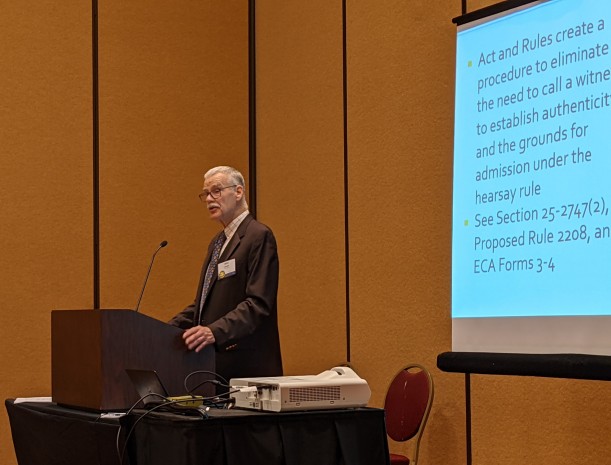New Civil Trials Act Seeks to Expedite Civil Litigation

University of Nebraska College of Law Professor Emeritus John Lenich explains upcoming changes to civil trials at the Nebraska State Bar Association Annual Meeting in La Vista, Wednesday, Oct. 13, 2021. (David Golbitz/Daily Record)
When Legislative Bill 912 — the County Court Expedited Civil Actions Act — goes into effect Jan. 1 2022, it is expected to increase access to the courts for potential personal injury plaintiffs who are seeking limited monetary relief.
To prepare lawyers for the changes in the new year, the Nebraska Association of Trial Attorneys presented a continuing legal education seminar explaining the nuts and bolts of the new law during the Nebraska State Bar Association’s Annual Meeting last month in La Vista.
University of Nebraska College of Law Professor Emeritus John Lenich broke down how the new law will impact civil cases that seek damages that are less than or equal to the county court jurisdictional amount, which in Douglas County is currently $57,000.
The act is also designed to streamline the litigation of the case by relaxing requirements for evidence, imposing limits on discovery, setting deadlines and limiting trial time.
Discovery
In the discovery stage, both the plaintiff and the defendant are limited to 10 interrogatories, 10 document requests, 10 requests for admission and three depositions — one deposition of the party and two depositions of nonparties.
It is hoped that the new law will also expedite litigation by requiring parties to disclose information up front that would normally be sought through discovery requests. This includes information about potential witnesses with nonprivileged information, witness statements, documents, damage claims and insurance policies. The rule also requires the plaintiff to agree to a release of their medical records if they are seeking damages for physical or mental injury.
Each side is also limited to a single expert witness, whose name and qualifications must be disclosed. Parties must also present any exhibits that will be used to support the expert’s opinions and a copy of the expert’s compensation or fee schedule.
Deadlines
The new law also sets deadlines by when certain actions must be taken. Discovery must be completed within 60 days of the start of the trial, and motions for summary judgment and notices of an intent to offer a document must be filed no later than 90 days before trial.
Time for Trial
Trials under the act should last no more than two days, with each side given six hours to complete jury selection, opening statements, presentation of evidence, examination and cross-examination of witnesses, and closing arguments.
The bill was modeled on Rule 1.281 of the Iowa Rules of Civil Procedure, which was adopted by that state in 2014.
The changes were proposed in part because it can be difficult for potential plaintiffs to retain a lawyer to handle liability cases, because the cost and time involved in litigating the case often outweigh the likelihood of success and the limited amount that can be awarded.
“It’s a great experiment. It’ll be interesting to see how the experiment unfolds,” Lenich said.
A video of NATA’s seminar and the associated materials will be available for CLE credit on demand at nebar.com this month.
User login
Omaha Daily Record
The Daily Record
222 South 72nd Street, Suite 302
Omaha, Nebraska
68114
United States
Tele (402) 345-1303
Fax (402) 345-2351




